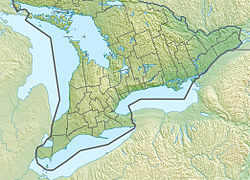| Beaver River | |
|---|---|
 Beaver River adjacent to the Trans Canada Trail in Scugog | |
| Location | |
| Country | Canada |
| Province | Ontario |
| Region | Central Ontario |
| Regional Municipality | Durham |
| Physical characteristics | |
| Source | Unnamed pond |
| • location | Scugog |
| • coordinates | 44°05′46″N79°04′39″W / 44.09611°N 79.07750°W |
| • elevation | 303 m (994 ft) |
| Mouth | Lake Simcoe |
• location | Brock |
• coordinates | 44°25′55″N79°09′50″W / 44.43194°N 79.16389°W |
• elevation | 219 m (719 ft) |
| Basin size | 327.3 km2 (126.4 sq mi) |
| Discharge | |
| • location | Beaverton, Ontario |
| • average | 2.833 m3/s (100.0 cu ft/s) |
| Basin features | |
| River system | Great Lakes Basin |
The Beaver River is a river in Durham Region in Central Ontario, Canada. [1] It is part of the Great Lakes Basin, and is a tributary of Lake Simcoe. The river's drainage basin is mostly in Durham Region with the remaining portion in the city of Kawartha Lakes; the entire watershed is under the auspices of the Lake Simcoe Region Conservation Authority. [2]
